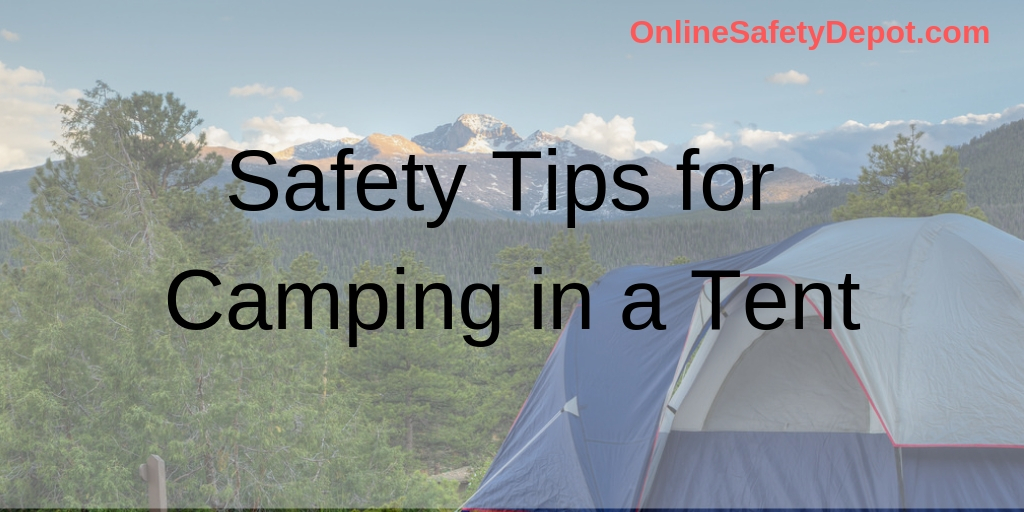Safety Tips for Camping in a Tent
Americans love camping and a chance to connect with nature, to enjoy clean air and thrill at the sounds of the rushing waters and distant elk bugling. Each year, roughly 40 million people go camping in the US and the majority of them (6 in 10 campers) are pitching a tent.
There is something exciting about leaving the comfort of our homes and trekking into the vast wilderness where bear, wolves and other animals call home. According to the North American Camping Report, the main reason why people love to camp is to get away from the internet, and the hustle and stresses of everyday life.
Having camped in a tent for the majority of my life, including many backcountry as well as backyard summer campouts, I thought it would be helpful to share with you four things I look for and do when I venture into the wilderness for some camping enjoyment.
Weather
Because tents are not insulated, I always check the weather before I go camping, especially if I am taking along the family. This is not because I am a fair-weather-camper, but because of the need to ensure that I am properly prepared.
As a rule, I like to check the weather for the 2 days leading up to the campout as well as during the campout. This will give me a better idea of how I should pack my cloths as well as camping gear. I don’t want to bring my -20 degree sleeping bag if the night temperature will be more moderate. Likewise, I want to pack my warm sleeping bag if the tempter will be significantly dropping at night.
I like to get the tent set up in the back yard a few days before the campout to ensure that there are no holes or missing poles, circumstances that could adversely affect the enjoyment factor of a night in the outdoors.
Location
Just as they say in real estate, location, location, location is the most important safety aspect to consider when tent camping.
Designated Campgrounds: unless I am camping in the backcountry, I always select a campsite in a designated campground as opposed to camping in a random location. The reason for this is because being in numbers is always safer – whether it’s from the wild animals or someone looking to do harm. I know that if a bear, or an uninvited and un-ruley individual, enters our camp, I can call for help and hopefully others willing to help will respond to my cry for assistance.
If you are totally new to camping or are camping with little ones, I strongly suggest you start out camping in a designated campground. This doesn’t mean you have to have campsites that are mere feet from each other, but you’ll be able to sleep a little easier knowing you’re not alone at night when in the wilderness.
Surroundings
Before you pitch your tent and run off to explore, consider the surroundings and any protentional dangers. For example:
Trees: are there any dead or half fallen trees that could come down on your tent if a storm rolls in through at night and the winds kick up?
Terrain: I’m not sure why it is, but I always have to get out in the middle of the night to either get a drink of water or hit the restroom. Walking at night, even with a flashlight, you could easily step in a hole or on the side of a rock and break a leg. Clear the campsite of any protruding rocks or low-hung branches, and fill in any holes that could pose a risk of injury both at night and during the day.
Water: It’s fun to camp by the river or lake. I remember many a campout where my friends and I set up our tent next to the lake, even right next to the lake. We loved the idea of being right next to the water and close to fishing. I guess in our minds the closer we were to the water, the sooner we could start the fishing. As previously mentioned, unfortunately sometimes the call of the restroom beckens at night and the need to leave your warm sleeping bag and venture into the darkness to relieve one’ self. Water and darkness are not the best mix for safety.
Always camp a safe distance from any water, river or lake. If a thunder storm dumping a lot of water passes through the area the potential of a swollen stream could expand enough to include the location of your tent and present the possibility of a wet experience if your tent is pitched too close to a stream or body of water.
Food Storage
Just because you are camped in a campground and near other campers, it is never a good idea to have food inside your tent, night or day. Animals, including bears, have been known to wander into campsites attracted by the smell of food. Just check out the video on the right that shows what a bear is willing to do to get food. Not even a highly electrically charged, road-killed deer will get this bear to stop when driven by hunger.
When tent camping, you should always store your food in a bear box, in your car (in a properly stored container) or up in a bear-pole tree to avoid any animals from getting to it. NOTE: bears are not the only animals you need to worry about. Wolves, coyotes, foxes, and even squirrels have been known to rip into tents looking for the food that has been left in the tents.
Protection
I Always have protection with me when I am camping, hiking or fishing in the great outdoors. This also includes in the tent at night. I will always have a trekking pole, bear spray and a knife with me. Being prepared for the unlikely, rarely experienced, seemingly unreasonable, is being properly prepared.
Next time you are tent camping, consider these tips to keep you and your loved ones safe and have an enjoyable trip.
Bonus:
Below are some links to some helpful camping gear you should have with you on your next camping trip

